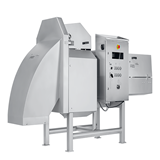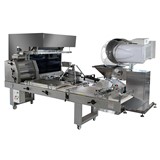Even a small change to the efficiency of photosynthesis could make a significant difference to yields.
Dr Erik Murchie, an expert in crop physiology at The University of Nottingham, is to take a lead role in a nationwide study to overcome some of the fundamental limitations of photosynthesis – the process used by plants to harvest energy from the sun. The hope is that this research will lead to major increases in crop yields for food, bioenergy and the production of renewable chemicals.
His study is one of five new research projects announced today by the Biotechnology and Biological Sciences Research Council (BBSRC). A total of just over £2m ($3.2m) has been provided for these projects which complement four funded last year via an 'Ideas Lab' in collaboration with the National Science Foundation in the USA.
Together, the nine research projects span the whole photosynthetic pathway, from the shape of the crop canopy and the structure of individual leaves through to light capture at the molecular level and the production and storage of sugars.
Dr Murchie, from the School of Biosciences, studies the factors that regulate and limit photosynthesis in crop plants. His work will focus on removing the inefficiencies of 3-dimensional canopy photosynthesis by the alteration of leaf light-response dynamics and plant architecture.
Productivity is the sum total of a large number of leaves in a canopy, many of which shade (or partly shading each other) and are usually different ages. Potential productivity of whole canopies can be calculated based on leaf photosynthetic attributes and other physical and physiological factors. However, the theoretical productivity tends to be much higher than the measured productivity. The reasons are unclear but a large part is thought to be due to the way leaves respond when re-constructed into a large 3D canopy.
In this state, plants exist as a community which has emergent properties that we cannot necessarily predict from plants grown individually. If we can eliminate the gap between the theoretical and measured productivity we can achieve a step change in productivity.
Dr Murchie said: “We hope to take good 3D images of crop canopies, both still and moving, calculate the typical changes in light intensity that occur in that canopy and then change photosynthetic dynamics so that it matches those changes.”
Science Minister David Willetts said: "Food security is an important issue for governments and researchers worldwide, and it's great to see UK scientists contributing to such a valuable body of international research. If we can gain a better understanding of the scientific processes underlying food production, we are a significant step closer to being able to support an increasing global population in future."
Biochemist Professor Richard Cogdell FRS from the University of Glasgow acted as a mentor for the Ideas Lab and was a member of the assessment panel for this call for applications. He said: "Trying to improve photosynthesis is challenging both scientifically in itself and because it requires the coming together of engineers, physicists, chemists as well as more traditional biologists. The new targeted programme in this area has allowed real innovative, 'out of the box' projects to be explored in a very exciting way."
Professor Janet Allen, BBSRC Director of Research, said: "Improving photosynthesis is a considerable challenge, so it is essential that we make the most of expertise in both the UK and the USA. We are encouraging a collaborative approach by holding regular workshops with researchers from all nine projects, in both the UK and US, so that they work together from an early stage.
"This research is ambitious, but if the scientists we are supporting can achieve their aims it will be a profound achievement."











-160x160-state_article-rel-cat.jpg)




